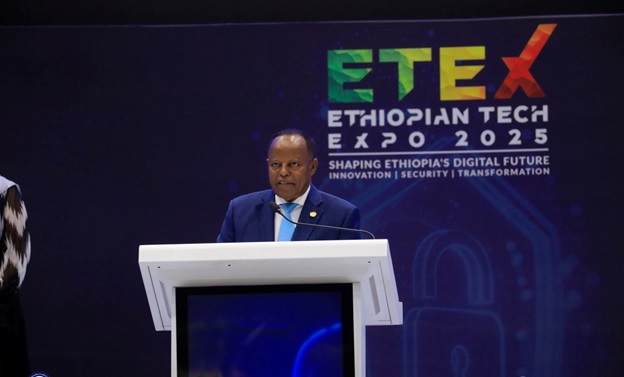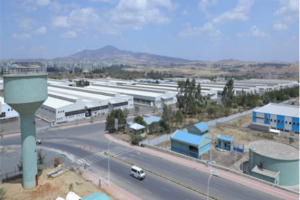
It is well comprehended that Ethiopia is actively pursuing digital transformation through its “Digital Ethiopia 2025” strategy, aiming at integrating technology across various sectors to drive economic growth and citizen engagement and social progress. This comprehensive approach focuses on infrastructure development, digital literacy and e-governance.
Speaking at the official inauguration of the Ethiopian Technology Expo – ETEX 2025 under the theme, ‘Shaping Ethiopia’s Digital Future,’ at Addis International Convention Center, President of the Federal Democratic Republic of Ethiopia President Taye Atske Selassie said that Ethiopia is determined to play a meaningful role in Africa’s technological progress, given its strategic location, young workforce and growing digital infrastructure. He further said that Ethiopia has embarked on technology, peculiarly the digital one, to meet its vision for a digitally empowered future and posterity in the years to come.
According to the President, Ethiopia has made notable strides in digital transformation and workforce development and the very key aspect of Ethiopia’s digital transformation, which comes at the forefront, is infrastructure development on which the government is investing in with a view to improving connectivity, power, and e-governance infrastructure to support digital transformation and other related aspects.
As to him, initiatives are underway to enhance digital literacy and skills for citizens, including the establishment of Digital Transformation Centers and partnerships with educational institutions, and the government is implementing e-governance reforms and a digital ID system to streamline public services and enhance efficiency.
He said, “Ethiopia is actively seeking partnerships with international organizations and private companies to support its digital transformation efforts. Despite progress, challenges remain, including the digital divide, low internet access, and the dire need for further investment in infrastructure and digital literacy programs. The Ethiopian government is collaborating with known international organizations around the sector to expand telecommunications infrastructure and internet access. Besides, the Ministry of Innovation and Technology is focusing on developing a skilled workforce to support the digital economy.”
As to him, Ethiopia’s unwavering commitment towards harnessing technology as a transformative force for sustainable development, economic prosperity, and societal progress has been bearing fruits. He said, “ Not only is ETEX 2025 an exhibition of technological advancements but it is also a dynamic platform for ideation, collaboration, and action, reflecting Ethiopia’s burgeoning stature as a leader in the global digital landscape.
He further elaborated that the Ethiopian Artificial Intelligence Institute (EAII) has taken the lead in fostering cutting-edge research and development in artificial intelligence, tailoring solutions to address Ethiopia’s unique challenges. EAII’s contribution is transforming lives and livelihoods ranging from AI-driven agricultural optimization tools that would potentially enhance food security to healthcare innovations that improve diagnostic accuracy.
Ethiopia’s digital transformation journey is a testament to its strategic vision and unwavering determination for real change in all circumstances. The Information Network Security Administration (INSA) has also played a pivotal role in establishing a world-class cyber security framework. The combined efforts of all concerned in this regard have helped Ethiopia earn recognition as a regional leader in cyber security, setting a benchmark for secure digital governance.
Cognizant of the fact that the youth in Ethiopia are the prime architects of tomorrow’s Ethiopia, the country have prioritized tech education through the Digital Ethiopia 2025 Strategy particularly focusing on the existing and/or the young generation to come, he underlined.
“Ethiopia has envisaged being the epicenter of Africa’s technological renaissance, a hub that catalyzes innovation and collaboration across the continent. This vision is deeply aligned with the African Union’s Agenda 2063, which envisions a prosperous, integrated, and technologically advanced Africa. Hence, ETEX 2025 serves as a microcosm of this ambition, bringing together African innovators, policymakers, and global experts to forge partnerships that amplify our collective impact,” he underscored.
Information Network Security Administration Director General, Tigist Hamid on her part said that establishing strategic partnerships with private companies, government entities, and international organizations have been instrumental in driving digital technology initiatives steps forward.
According to her, the Ethiopian Technology Expo 2025—is East Africa’s largest and most transformative technological showcase and this mighty shift has helped the nation strengthen its digital economy.
She said, “It is a pivotal moment in history—a time of remarkable global transformation, driven by technology. Our journey is guided by the “Ethiopia 2030: The Pathway to Prosperity” roadmap—a vision that places technology and digital innovation at the heart of Ethiopia’s progress. The five core pillars of technological advancement through digital transformation are, cyber security, AI, Finetech, smart City and ICT, especially the latter stands tall as a transformative force—one that empowers every sector it touches.
She said through strategic partnerships, robust policies, training, and awareness campaigns, INSA is building a cyber-resilient Ethiopia.
UAE Cyber Security Council Head, Mohamed Al Kuwaiti (PhD) on his part in an exculusive interview taking the multitude advantage of cyber security and other related crucial sectors, UAE has established bilateral ties with Ethiopia as collaboration or partnership is very important and is of paramount importance in boosting cyber resilience for digital transformation.
He said, “The president has put the importance of cyber security and other related factors for the developemnnt of the younger generation. We as UAE are commiuted enough to well agument our partnership with Ethiopia espeacilly in Cybersecurity, AI and other indispensable subsectors.”
Yes, he added the commmitemnt of the nation to work closely with interantioal organizations and investors is instrumetntal in addressing internet challenges and building a more inclusive and interconnected digital future for the nation and beyond by exploring ways to improve Internet infrastructure, enhance digital literacy, and promote responsible use of the internet.
Mohamed Al Kuwaiti (PhD) also said that African governments and other players need to take a proactive role in the digital growth to transform and ensure prompt social, economic and other related aspects.
He also stressed that formulating and executing policies that will contribute in ensuring the technological ecosystem that could accelerate the Africa’s transition into a robust and inclusive digital economy has to be well consolidated.
He said Ethiopia has been achieving impressive achievements in digital transformation, cybersecurity culture development the efforts gerard towards digital transformation have definitely aimed at supporting entrepreneurship, startup growth, and the creation of new resources.
The cybersecurity and other digital developments have become an indispensable tool for economic growth, social development, and communication, he stated adding that cross border connections empower individuals and drive innovation.
The strategy designed along that line aims at realizing building a truly inclusive and prosperous digital future for Ethiopia on the successes of the current initiatives. Ethiopia is undertaking digital transformation that covers connectivity, enabling system and e-government along with supportive regulatory framework that allows collaborative platforms.
“Many African countries have taken the lead and reinvigorating the digital transformation as these aspects present significant opportunity for Ethiopia to transform and communicate with other digital economies. I don’t think many African states are vulnerable to cybersecurity attack, too,” he said.
“The governments of Africa need to strive to realize digital transformation and introduce legal frameworks that ensure responsible use of the platform via well defending cyber-attach and boosting the way to build resilence including governance, policy, procedures, legislations, and building the technology. Yes, we have to be inventors of technology instead of being users of it. Besides, we have to strengthen partnership as it is the very way to share information,” Mohamed(PhD) underscored.
BY MENGESHA AMARE
THE ETHIOPIAN HERALD THURSDAY 22 MAY 2025



